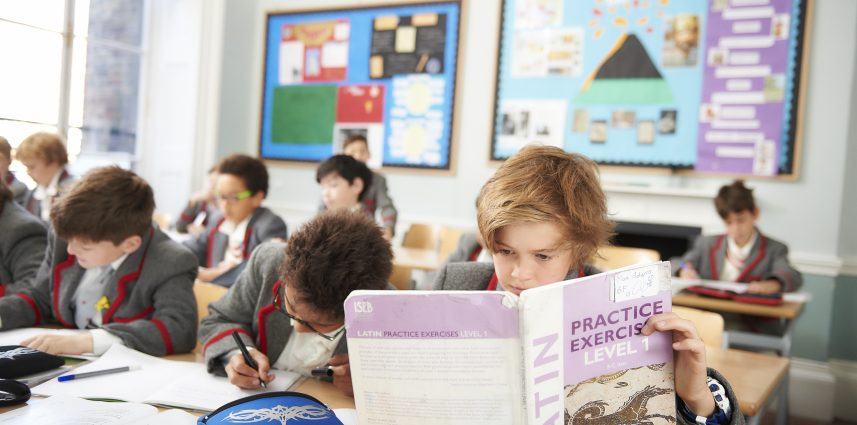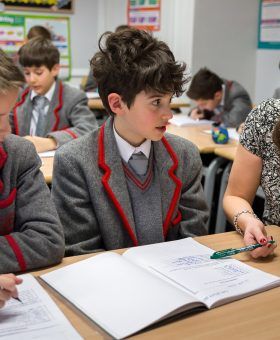LATIN
The Classics Department is responsible for teaching Latin, Greek and Classical Civilisation, encompassing not only the language but also cultural, historical and mythological elements of the ancient world. The breadth of this study offers boys an insight not only into ancient cultures but also into their own; it also heightens their linguistic, logical and literary awareness, making them better students of modern languages, English, Maths and History.
Boys begin their study of Latin in Year 6. They learn why we still study Latin and its applications in the modern world, as well as its influence on many European languages. Boys gain a firm grounding in grammatical terminology and a solid basis of vocabulary, derivation, etymology and syntax on which to build. There is a one-hour homework on weekly basis, consisting of vocabulary learning, grammar terminology, translation of passages and individual sentences from Latin into English and vice versa as well as mythology, and an exam of a full Common Entrance or scholarship paper in the autumn, spring and summer terms.
GREEK
Classical Greek Language Course is addressed to any Year 6, 7 or Year 8 boys who would wish to attend Classical Greek Language lessons as an additional topic to Latin and it is offered on Fridays as a school Club. Classical Greek is optional as a course and the main purpose is to cover the Common Entrance Syllabus of Classical Greek Level 1 and to further progress in Level 2 and/or scholarship level. The boys are introduced to the following aspects of the Greek Language:
- The Greek Alphabet
- Transliteration of English words to Greek and the other way round
- Reading and Pronunciation of Greek words
- Derivation of many English words from Greek Language
- Grammar A (conjugation of Verbs and Declensions of Nouns)
- Grammar B (tenses of verbs: present, future and imperfect)
- Translation of small or longer passages from Greek to English.
At the end of each academic year, the boys who attend these lessons sit for the Common Entrance Level 1 Classical Greek exam paper OR their scholarship Classical Greek exam if they choose to go through that path. This course is highly suggested for all the boys who are highly motivated by the subject of Classics as well as the Scholarship candidates.
As in Winston Churchill’s words: “Naturally I am biased in favour of boys learning English;
and then I would let the clever ones learn Latin as an honour and Greek as a treat”.
Classics (Latin and Greek) is very highly regarded by universities across a wide range of disciplines. Many universities, including Oxford and Cambridge recommend A Level Latin and / or Greek for students intending to read Classics, Classical Studies or Ancient History. The knowledge of the classical past is particularly useful for the study of History, English, Politics, Art and Philosophy.
As in Aristotle’s words: “We are what we repeatedly do. Excellence, then, is not an act, but a habit”.
COMMON ENTRANCE LATIN PREPARATION
Preparation for the Common Entrance (CE) starts in Year 6 and continues through to Year 8. The boys are formally assessed throughout the year using Common Entrance past papers, and are continually tested on the prescribed vocabulary, grammar and mythology. As the Common Entrance exam provides for different levels of ability within the subject, each pupil will be entered at an appropriate level according to his ability, progression and demands of the senior school he intends to join.
The main text used in all year groups is ISEB Latin Practice Exercises, which provides the rigorous level of grammar required for CE and Scholarship standard. Additional resources such as online games and interactive learning tools form an important part of lessons for all year groups.
Greek Mythology and etymology form additional important elements of the linguistic and non-linguistic aspects of the syllabus.
Tanvi Punatar
Head of Classics
CLASSICS LINKS – USEFUL WEBSITES:
http://www.minimus-etc.co.uk/SiteNews_page.htm
http://www.pantheon.org/areas/mythology/europe/greek/




 From 2025 you can continue your journey at Wetherby Pembridge, this premium co-educational senior school in the heart of London will welcome pupils from Year 7 to Year 9 bringing together the proven academic excellence of Wetherby and Pembridge Hall.
From 2025 you can continue your journey at Wetherby Pembridge, this premium co-educational senior school in the heart of London will welcome pupils from Year 7 to Year 9 bringing together the proven academic excellence of Wetherby and Pembridge Hall.